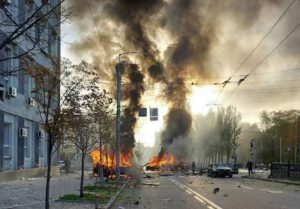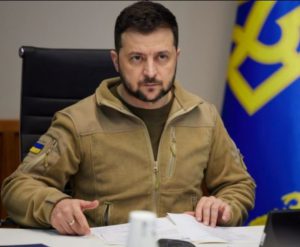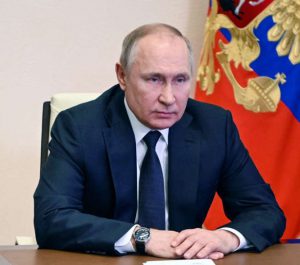Analogies between contemporary atrocities and those of previous wars are always risky; at times, commentary about Russia’s war on Ukraine has strained to make such analogies. Just now, though, it takes effort not to. Russian President Vladimir Putin’s launching of missiles against Kyiv, Kharkiv and other places Monday recalls past terror-bombing attempts ranging from the mutual attacks by Iraq and Iran during their War of the Cities in the 1980s to the V-2 terror-bombing of Western European cities by Germany in the final stages of World War II.
Like those strikes, the 84 cruise missiles and 24 drones Mr. Putin launched — killing at least 14 and injuring 97 more — serve no real military purpose. His first objective was to instill fear in residents of population centers far from the front lines and cripple the electricity, water and other critical infrastructure on which they depend. His second goal was payback: revenge for the destruction Saturday of a key bridge connecting Russia with Crimea, likely carried out by Ukraine, and more generally for Ukraine’s recent successes in the war. Finally, the implied threat of nuclear bombardment using similar delivery vehicles cannot be ignored.
Hard-liners in Russia, who have been urging Mr. Putin to target Ukraine’s civilian areas and infrastructure, pronounced themselves pleased with this appalling escalation. They are deceiving themselves: Russian artillery and aircraft have already sown vast death and destruction on cities across Ukraine, achieving little more, strategically, than to make Ukrainians who weathered those onslaughts more committed to fight. If history is any guide, the latest attacks will further stiffen Ukrainian resolve, just as the V-2 campaign 78 years ago galvanized the British people. Mr. Putin targets civilians at a time when his side is floundering and facing defeat in the actual contest of armies, so add desperation to the list of his motivations he shares with past terror-bombers.
President Biden and other Western leaders promptly denounced this Russian atrocity. The next step, diplomatically, is to forge ahead with a United Nations resolution condemning Russia’s purported annexation of four Ukrainian regions, which should come up for a vote in the U.N. General Assembly in coming days. Russia vetoed it in the U.N. Security Council, with 10 members voting in favor — and four other countries, including China and India, abstaining. The former of those two has tacitly backed Russia’s war, albeit without substantial direct arms shipment; the latter has pursued ostensible neutrality. After Russia’s attacks, however, both called for de-escalation, a possible sign their positions are becoming decreasingly tenable. The General Assembly vote usefully puts them, once again, on the spot.
In more practical military terms, the Russian attack shows that Ukraine needs more and better air defense systems, in addition to the ones it already has — which it used to shoot down 43 of the missiles Moscow launched. The United States says delivery of its National Advanced Surface-to-Air Missile System, or NASAMS, should be complete within “several weeks.” German systems are also en route. France, meanwhile, has hesitated, reportedly because of parts shortages. Whatever the obstacle, Paris needs to overcome it.
Enabling Ukraine to limit the damage from Mr. Putin’s aerial terrorism will help ensure that, like similar campaigns in the past, this one proves an exercise in strategic futility.
https://www.washingtonpost.com/opinions/2022/10/10/russia-bombing-ukraine-nato-support/
Ramin’s comments:
This is a sad part of our history. The crises in Ukraine and the wold economy situation in 2023 is not promising and sadly the world is going through a dark part of its history. I hope 2023 will bring peace for all.




